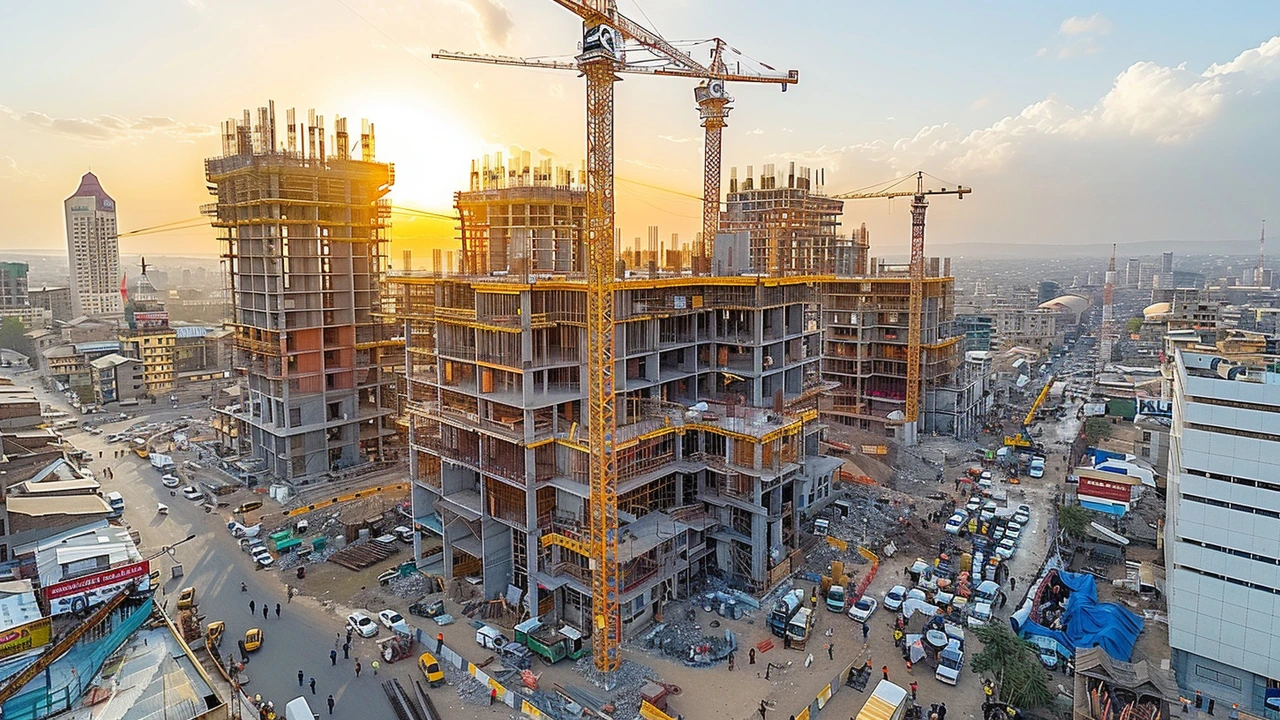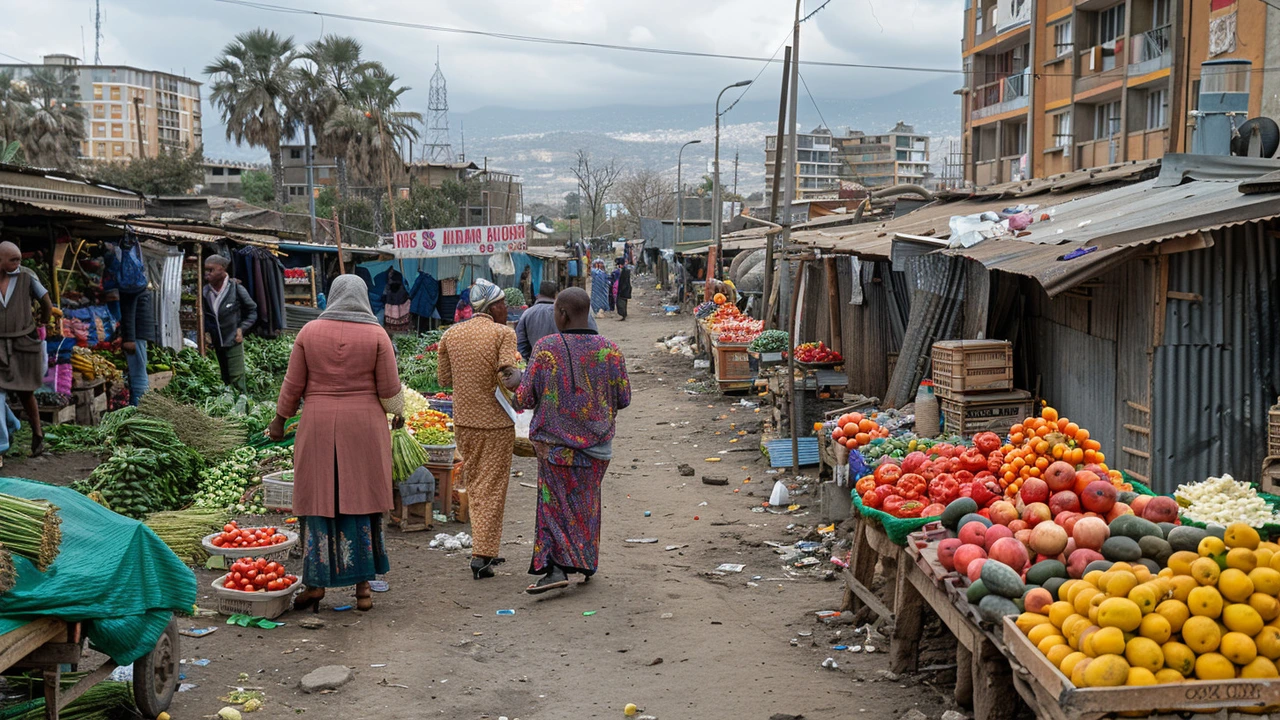Is Ethiopia a good place to do business? It's a question that might have crossed your mind, especially with the recent buzz around Ethiopia's economic growth. This East African nation has shown significant promise, making it worth a closer look.
First, let's get the lay of the land. Ethiopia has been one of the fastest-growing economies in Africa, attracting global attention. Growth rates have been hovering around the double digits before the pandemic hit, and there’s a renewed optimism as recovery processes unfold. The government has been pushing forward policies to attract foreign investments while improving infrastructure to support new ventures.
For those looking to invest, understanding the key industries is crucial. Agriculture remains a cornerstone, with coffee being a major export. Additionally, textiles, leather, and energy sectors have shown substantial potential, making Ethiopia diversified in its offerings.
While the opportunities are enticing, one must be mindful of the challenges. Regulatory landscapes can be tricky, and the ease of doing business has room for improvement. Nevertheless, with the right preparation and local partnerships, these hurdles can be navigated effectively.
If you're considering diving into the Ethiopian market, practical tips can help. Familiarize yourself with local regulations, understand cultural nuances, and engage with credible local partners. Doing so can position your venture for a smoother entry and sustainable growth.
- Economic Landscape
- Key Industries
- Business Opportunities and Challenges
- Practical Tips for Investors
Economic Landscape
Take a look at Ethiopia, and you'll see a nation bursting with potential. The country's economy has been on an impressive upward trajectory for the past decade, consistently ranking among the fastest-growing economies in Africa. As of 2023, Ethiopia's GDP growth rate hovered around 7.5%, a testament to its resilience and capacity for sustained growth.
Part of this growth can be attributed to the Ethiopian government's proactive stance. They've actively courted foreign investors by implementing favorable policies and incentives. Tax holidays, customs duty exemptions, and a streamlined process for setting up businesses have made Ethiopia an increasingly attractive destination for foreign capital. These efforts are borne out in the surge of international companies setting up shop in Addis Ababa and beyond.
However, this economic boom isn't just about numbers. Ethiopia has invested heavily in infrastructure, which has had a ripple effect across various sectors. The urban skyline of Addis Ababa transforms almost every year, showcasing modern buildings and improved public transportation systems. In a recent interview, Prime Minister Abiy Ahmed noted, "Our commitment to infrastructure development is unwavering, because we believe it is the backbone of sustainable economic growth."
One of the main drivers behind Ethiopia's economic success is its strategic focus on key industries like agriculture, manufacturing, and energy. Agriculture alone employs nearly 70% of the population and contributes significantly to export earnings. Meanwhile, the manufacturing sector, particularly textiles and garments, has seen steady growth, supported by the establishment of industrial parks.
But it's not just traditional industries that are booming. Ethiopia is also eyeing the future with investments in renewable energy. The Grand Ethiopian Renaissance Dam, for instance, aims to boost the country's electricity production, providing more reliable power to both urban and rural areas. This aligns with the government's ambition to position Ethiopia as a renewable energy hub in Africa.
Yet, no economic landscape is without its challenges. Inflation rates have been somewhat volatile, posing a risk to both local consumers and businesses. Moreover, while the government has made strides in regulatory reforms, operating in Ethiopia still comes with bureaucratic hurdles. According to the World Bank's Doing Business report, Ethiopia ranks 159th out of 190 countries, indicating room for improvement in ease of doing business.
Nevertheless, the groundwork is laid for a promising economic future. The blend of rapid infrastructure development, a young and growing labor force, and targeted government policies makes Ethiopia a compelling choice for investors looking to be part of something big. Of course, due diligence and a clear understanding of local market dynamics remain crucial for any business venture in this diverse and complex market.

Key Industries
When discussing key industries in Ethiopia, one cannot overlook the significance of agriculture. Ethiopia's agricultural sector is the backbone of its economy, employing about 70% of the population. It contributes substantially to the country's GDP and is a major source of foreign exchange. Among the agricultural outputs, coffee stands out as Ethiopia's star export. Known for its rich aromatic beans, Ethiopian coffee is highly sought after worldwide. The country is the birthplace of coffee, and its cultivation and export have deep cultural and economic roots.
Apart from coffee, Ethiopia produces an array of other cash crops, including sesame seeds, pulses, and spices. These products play a crucial role in international trade and offer competitive advantages due to their high quality. For instance, Ethiopian sesame seeds are recognised for their excellent oil content and are exported to countries like China and Japan.
Agriculture and Its Potential
Moving beyond agriculture, Ethiopia's textile and apparel industry showcases immense potential. With a large, young workforce and initiatives like the establishment of industrial parks, this sector has become a magnet for foreign investments. The Ethiopian government's vision is to transform the country into a leading manufacturing hub in Africa. Policies aimed at enhancing the value chain from cotton production to finished garments are a testament to this commitment.
A vital area within industrial manufacturing is leather and leather products. Ethiopia possesses one of the largest livestock populations in Africa, providing a steady supply of raw materials for leather production. The quality of Ethiopian leather is well-regarded, and products such as shoes and bags enjoy a substantial market both locally and internationally.
According to the Ethiopian Investment Commission, "The strategy to leverage our comparative advantage in livestock resources has been pivotal, positioning Ethiopia as a competitive player in the global leather industry."
Energy Sector
The energy sector also emerges as a critical industry, driven by the country's abundant renewable energy resources. Ethiopia is touted as the water tower of Africa, thanks to its significant hydroelectric potential. Projects like the Grand Ethiopian Renaissance Dam (GERD) aim to harness the power of the Blue Nile, potentially elevating Ethiopia into a net exporter of electricity in the region. This opens doors for investment opportunities in renewable energy generation, particularly in solar, wind, and hydro power.
The energy sector’s growth could catalyze extensive industrial and technological development, further diversifying Ethiopia's economic portfolio. This is particularly advantageous in a world progressively leaning toward sustainable and green energy solutions.
In addition to these prominent sectors, mining highlights another arena rich with potential. Ethiopia boasts reserves of gold, tantalum, potash, and gemstones. The mining sector remains relatively untapped, presenting substantial opportunities for exploration and development.
These key industries collectively paint a promising picture of Ethiopia's economic landscape. For potential investors, understanding these areas is crucial. Each sector offers unique advantages and growth potential, positioning Ethiopia as a compelling destination for business ventures.

Business Opportunities and Challenges
When considering Ethiopia as a potential hub for your business activities, it’s important to weigh both the opportunities and challenges. Ethiopia’s business landscape is rich with possibilities, particularly given its rapid economic growth and strategic positioning within Africa. But like any developing market, it comes with its own set of hurdles.
One of the most appealing aspects of doing business in Ethiopia is its youthful population. With more than 60% of its citizens under the age of 25, the country offers a large and energetic workforce that is keen to learn and participate in various industries. This demographic advantage is a significant draw for companies looking to establish large-scale operations. The investment in education by the government also means there's a growing number of skilled workers entering the job market each year.
Ethiopia’s market offers robust opportunities across several key sectors. Agriculture is a linchpin, with coffee production being the crown jewel. The nation is the birthplace of Arabica coffee, and it remains one of the largest producers in the world. Along with coffee, the horticulture sector, including cut flowers and fresh fruits, has shown immense growth potential. For those interested in manufacturing, the textile and garment industry is burgeoning. The government has established several industrial parks designed to attract foreign investors, with the added incentive of tax holidays and duty-free import of machinery.
The Ethiopian government has been proactive in creating a more business-friendly environment. Policies such as the Growth and Transformation Plan emphasize infrastructure development, particularly in roads, hydroelectric power, and telecommunications. These improvements are designed to make it easier for companies to operate and grow in the region. It’s worth noting that Ethiopia’s strategic location in the Horn of Africa provides access to regional markets and trade routes, making it an attractive entry point into East Africa.
Despite these promising opportunities, doing business in Ethiopia does come with its challenges. The regulatory environment can seem complex and daunting for those unfamiliar with it. Navigating the processes for obtaining business licenses, dealing with customs, and understanding local tax regulations requires due diligence and possibly the assistance of local experts. Political stability has improved significantly in recent years under the new administration, but investors should remain aware of any potential political or social changes.
Ethiopia has made significant progress in recent years to improve its business environment, but challenges remain. Understanding local regulations and forging strong partnerships with local businesses can help foreign investors navigate the market effectively.
Another noteworthy challenge is the relatively low ease of doing business ranking. According to the World Bank’s Doing Business Report, Ethiopia varies in metrics like starting a business, getting construction permits, and trading across borders. However, these metrics are gradually improving as the government continues to implement reforms aimed at easing these processes.
In summary, Ethiopia presents a landscape rich with opportunities for the astute investor willing to navigate its complexities. By understanding the local environment, leveraging the youthful and dynamic workforce, and taking advantage of government incentives, businesses can position themselves for success. Being aware of the challenges and equipped with the right local knowledge and partnerships, the potential for growth in Ethiopia is substantial.

Practical Tips for Investors
If you're considering taking the entrepreneurial plunge into Ethiopia, it's a smart move to prepare thoroughly. This country offers great potential, but like any market, it requires a nuanced approach to navigate successfully.
First off, understanding the local business environment is crucial. Ethiopia operates a unique mix of traditional and modern practices. This blend can present both opportunities and challenges. It's important to familiarize yourself with local regulations and laws. For example, the Ethiopian Investment Commission (EIC) offers significant resources for new investors, providing clarity on prerequisites and legal frameworks. Utilize their platform to make sure you’re compliant right off the bat.
Building strong local partnerships is another key to success in Ethiopia. Establishing relationships with local businesses and stakeholders can provide invaluable insights and support. These partnerships can help you navigate the local market dynamics effectively. As an investor, you should network with credible local partners who can assist with regulatory compliance and cultural nuances. It’s a strategy that’s worked for many and can ensure smoother operations.
Ethiopian Investment Commission states, "Foreign investors considering investing in Ethiopia should collaborate with reputable local partners to navigate the business landscape efficiently."
When it comes to understanding cultural nuances, a deeper look at Ethiopian norms and values is essential. Ethiopian culture highly values relationships and trust, which often means business negotiations can take time. Patience and respect for these norms are vital. Showing understanding and appreciation for the local culture can go a long way in establishing long-term business relationships.
Also, be prepared to deal with administrative processes that might differ from what you are used to. Bureaucracy can sometimes slow things down, so planning your timelines with some flexibility is advisable. Working closely with local consultants who understand these processes can save you time and frustration. Moreover, having someone on the ground to assist with paperwork and bureaucratic hurdles can be priceless.
Another tip is to pay attention to the infrastructure. Ethiopia has been investing heavily in infrastructure, like roads, railways, and industrial parks, which can be a boon for new businesses. Take time to explore these developments because they can affect logistics, supply chains, and overall business efficiency. Knowing the best locations for setting up shop is crucial, and industrial parks like Hawassa and Bole Lemi offer excellent opportunities.
Lastly, keep an eye on economic policies. Ethiopia's economic strategy, Growth and Transformation Plan (GTP), aims at bolstering key sectors like manufacturing and agriculture. This can mean big opportunities for investors if you align your business with these targeted growth areas. Being aware of these strategic focuses can help you make informed decisions on where to invest.
By taking these practical tips into account, you'll be better equipped to make a successful entry into Ethiopia's growing market. It's a land of untapped potential, and with the right approach, your business can thrive and contribute to this dynamic economy.

 Is Addis Ababa a Good Place to Live in 2024?
Is Addis Ababa a Good Place to Live in 2024?
 Is Healthcare Free in Ethiopia? Understanding the Costs and Accessibility
Is Healthcare Free in Ethiopia? Understanding the Costs and Accessibility
 Bringing Cash into Ethiopia: Limits and Tips for Travelers
Bringing Cash into Ethiopia: Limits and Tips for Travelers
 Travel Safety in Ethiopia: Current Insights for 2024
Travel Safety in Ethiopia: Current Insights for 2024
 Understanding Taxation in Ethiopia: Do Ethiopians Pay Taxes?
Understanding Taxation in Ethiopia: Do Ethiopians Pay Taxes?
Larry Keaton
June 22, 2024 AT 17:32Yo fam, Ethiopia's growth numbers are lookin' mad solid, but dont get cocky. The gov't incentives are sweet, yet the red tape can still choke ya. Partner up with a local crew, they know the drill. And remember, you gotta hustle hard to cut through the bureaucracy. Stay sharp.
Liliana Carranza
June 28, 2024 AT 01:07Wow, Ethiopia's vibe is electrifying! 🌟 The coffee scene alone is a gold mine, and the textile parks are buzzing with potential. I love how the young workforce brings fresh energy to every project. If you blend cultural respect with solid market research, success feels inevitable. Let’s cheer on every bold investor stepping in!
Jeff Byrd
July 3, 2024 AT 08:42Sure, just jump into Ethiopia’s market without a local partner – what could possibly go wrong?
Joel Watson
July 8, 2024 AT 16:17The macroeconomic trajectory of the Ethiopian Federation warrants a rigorous, evidence‑based appraisal. While the GDP expansion is commendable, structural impediments-namely fiscal opacity and regulatory inertia-necessitate a calibrated risk mitigation strategy.
Chirag P
July 13, 2024 AT 23:51It is essential to honor Ethiopia’s rich cultural tapestry while navigating its business climate. Engaging respectfully with community leaders fosters trust and streamlines operations. Moreover, leveraging the government’s investment incentives can amplify returns when executed with due diligence.
RUBEN INGA NUÑEZ
July 19, 2024 AT 07:26Do your homework, secure a reputable Ethiopian partner, and you’ll bypass the usual bureaucratic quagmire. The legal framework is straightforward once you understand the procedural checkpoints. Aggressive follow‑up on permits cuts delays dramatically.
Michelle Warren
July 24, 2024 AT 15:01i think Ethiopia is coolnd but also i heard they got alot of red tape that can be a total headache lol the coffee is amazin but the paperwork?? ugh i dont kno w
Christopher Boles
July 29, 2024 AT 22:35Investing in Ethiopia can be a rewarding journey if you stay patient and keep learning. The government’s infrastructure projects are opening new pathways for logistics. Building good relationships with local suppliers will make your supply chain smoother.
Crystal Novotny
August 4, 2024 AT 06:10Ethiopia offers growth potential but also hidden pitfalls you must navigate carefully
Reagan Traphagen
August 9, 2024 AT 13:45Don’t be fooled by the glossy reports – the elite are using Ethiopia as a pawn in a larger geopolitical game to control African resources. Every foreign contract is a surveillance portal for foreign intel.
mark sweeney
August 14, 2024 AT 21:20yeah the hype is overblown im not buying the whole “Ethiopia is the next big thing” narrative lol
randy mcgrath
August 20, 2024 AT 04:54The demographic dividend in Ethiopia presents a unique opportunity for long‑term investors. A youthful labor force coupled with expanding urbanization can drive demand across sectors. Sustainable strategies will be key to harnessing this momentum responsibly.
Frankie Mobley
August 25, 2024 AT 12:29Practical tip: visit the industrial parks in Hawassa and Bole Lemi before committing capital. Seeing the infrastructure firsthand helps you gauge operational suitability.
ashli john
August 30, 2024 AT 20:04Stay flexible your timelines need room for the paperwork and remember relationships matter more than contracts in Ethiopia
Kim Chase
September 5, 2024 AT 03:39its super important to respect the local customs and t hink about community impact before you start any big project
David Werner
September 10, 2024 AT 11:13The shadows of unseen forces loom over Ethiopia’s investment landscape; every policy shift could be a covert maneuver by hidden syndicates. Beware the silent watchers who manipulate market data for their own gain.
Paul KEIL
September 15, 2024 AT 18:48From a macro‑strategic perspective, Ethiopia represents a high‑beta frontier market archetype, wherein sectoral diversification mitigates systemic risk exposure while leveraging sovereign credit enhancements.
Horace Wormely
September 21, 2024 AT 02:23Correction: “high‑beta” should be hyphenated without the space, and “sovereign credit enhancements” requires an article-use “the sovereign credit enhancements.”
christine mae cotejo
September 26, 2024 AT 09:58Ethiopia's investment climate is evolving rapidly, offering both opportunities and challenges for foreign enterprises. The government's commitment to infrastructure development has yielded new highways, rail links, and industrial parks that dramatically improve logistical efficiency. Nevertheless, navigating the regulatory environment demands patience, as licensing procedures often involve multiple agencies. Engaging a reputable local consultancy can streamline the permit acquisition process and provide invaluable cultural insight. When evaluating potential sectors, prioritize those aligned with the country's Growth and Transformation Plan, such as agro‑processing, textiles, and renewable energy. Agricultural ventures benefit from Ethiopia's abundant arable land and favorable climate, yet require careful water resource management. Textile manufacturers should consider the availability of locally sourced cotton and skilled labor, while also accounting for import duties on specialized machinery. Renewable energy projects, especially hydro and solar, are bolstered by the nation's vast untapped potential and supportive policy frameworks. Investors must also assess currency risk, as the Ethiopian birr's exchange rate can fluctuate in response to external shocks. Hedging strategies, including forward contracts and diversification of revenue streams, can mitigate such financial exposure. Building strong relationships with government officials and community leaders fosters trust and can accelerate project approvals. Corporate social responsibility initiatives, such as community education programs, enhance brand reputation and facilitate smoother operations. Tax incentives, including holidays and duty exemptions, are tiered based on investment size and location, making thorough financial modeling essential. Finally, continuous monitoring of policy changes and macro‑economic indicators ensures that your business remains agile and responsive. By integrating these considerations into a comprehensive entry strategy, investors can position themselves for sustainable growth in Ethiopia's dynamic market.
Douglas Gnesda
October 1, 2024 AT 17:32Excellent breakdown; complementing that, leveraging local university research hubs can provide cutting‑edge agritech solutions that further boost productivity and align with Ethiopia’s innovation agenda.